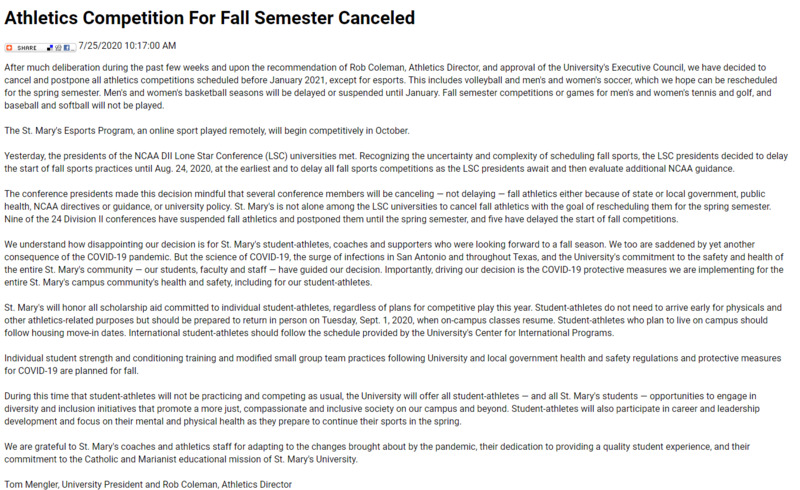Adapt to Combat: A Change in Procedure
Jordan McKinley (English) and Vianne Beltran (History)
St. Mary's University
The Beginning
COVID-19 has infiltrated all aspects of life -- schooling, work, family, and friends. Throughout this pandemic, there have always been reminders in the background showing us that it is still an ongoing crisis. From the moment the pandemic began there has been a constant cycle of modifications to systems and procedures, and people often do not agree on what the best courses of action for managing this pandemic are. Because of this constant need for adaptation in response to the ever-changing pandemic, our knowledge about the virus and our planned courses of action for today have the potential to completely shift tomorrow as new information and statistics come to light.
In order to combat this pandemic, it is important to stay as up-to-date as possible. St. Mary's University has taken steps to keep its population informed, through efforts such as the creation of an "Emergency Updates" webpage. Additionally, in a time where face-to-face interacting is not always the safest option, St. Mary's has utilized social media in order to help keep a sense of closeness and togetherness within the St. Mary's community. All of these efforts have transformed St. Mary's as we know it and will continue to transform it as we continue to adapt in order to combat the effects of COVID-19 together.
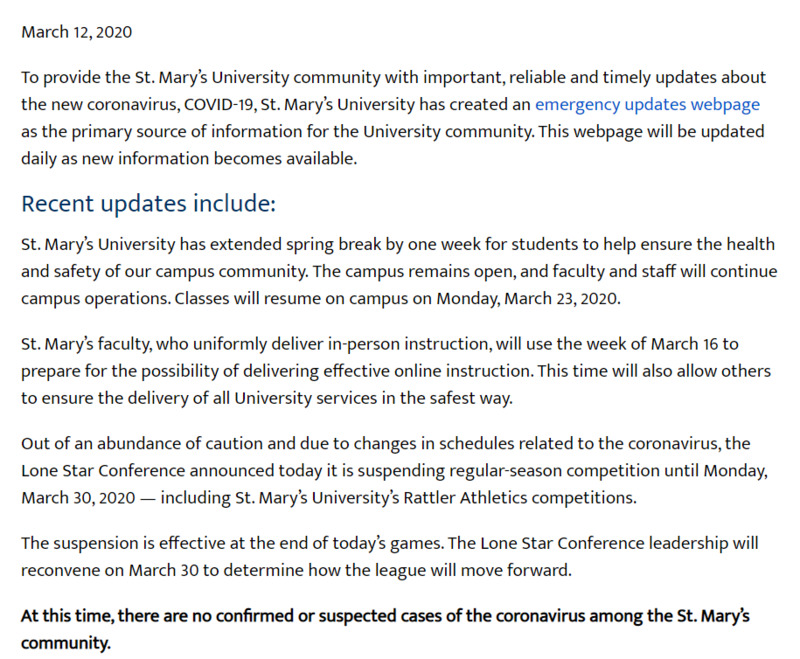
A Permanent Break
A screenshot of the email sent out in March 2020 announcing the extension St. Mary's spring break due to COVID-19.
The Classroom
When we think of college, we think of things like lectures and projects and building connections. Students faced a major change with these things when classes switched to online. Suddenly, students felt a disassociation from one another due to the lack of in-person interactions. The traditional classroom had transformed and now students were faced with the tasks of adapting to receiving their education. Listening to lectures, working on projects, and building relationships looked completely different for students after the need to switch online, with many students agreeing there is no replacement for in-person teaching. Because of this, various COVID restrictions have been set in place on campus; masks will still be worn, social distancing will still be encouraged, and testing kiosks will still be on campus as long as COVID-19 is around. St. Mary's is hopeful that with community cooperation, this change in procedure is only temporary, and that things will begin to restore to how they once were before the start of the pandemic.
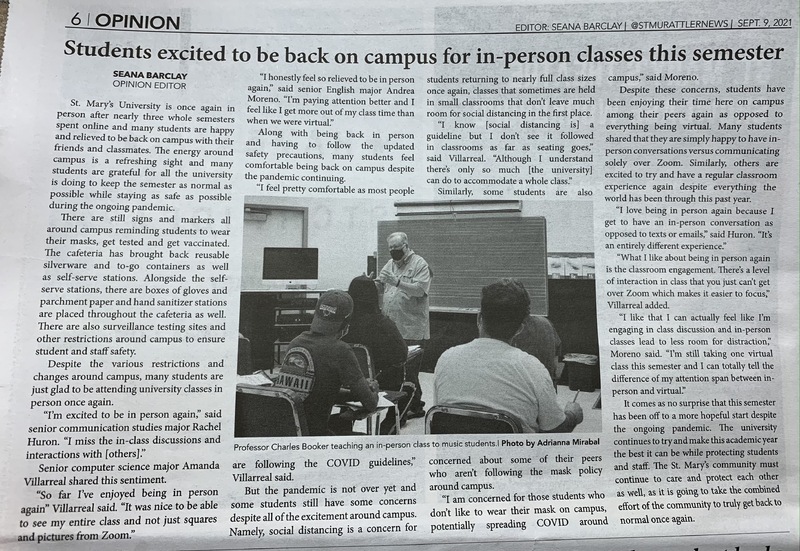
Looking Back to Look Forward and Adapting to Overcome
This St. Mary's University Rattler Newspaper text story from September 9th, 2020 focuses on transitioning between virtual and in-person classes.
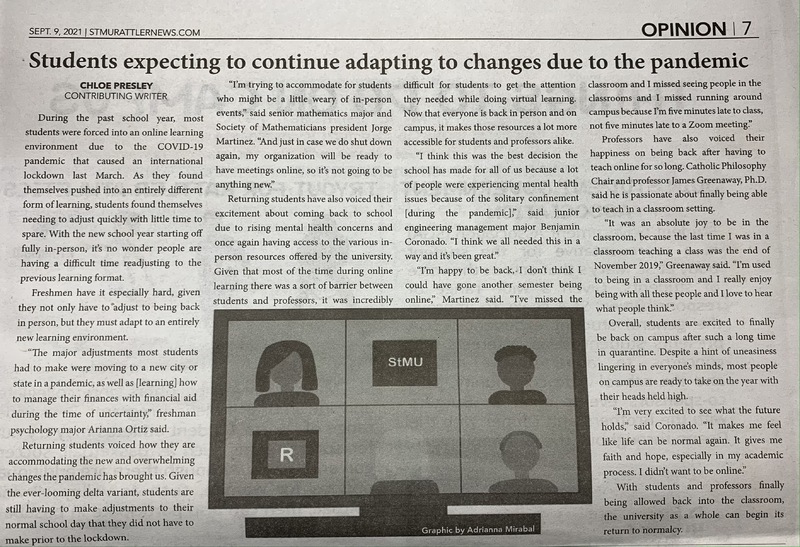
Looking Back to Look Forward and Adapting to Overcome
This text story from St. Mary's University Rattler Newspaper discuss how students have been adapting throughout the past few years. This article from September 9th, 2020 focuses on students' need to continue adapting with the pandemic.
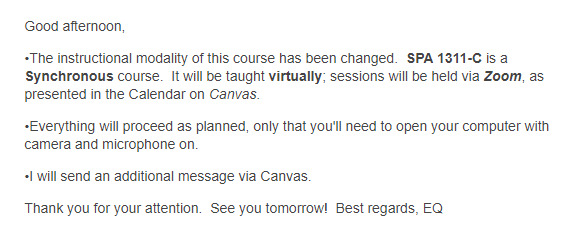
Last Minute Changes in Teaching
A screenshot of an email of a teacher changing the setting of the classroom from in-person to online at last minute for the Fall 2021 semester.
5k for the Neighborhood
One specific instance of the university's adaptations was in its annual 5k for the Neighborhood. This is usually an event that brings students, staff, and alumni together to join in running to raise funds to assist the neighborhoods surrounding the university. Below are screenshots from St. Mary’s Instagram page encapsulating the changes surrounding this marathon, which can first be seen being held in person with no sign of COVID precautions in 2019, then virtually in 2020, and finally back to being in-person, but with precautions such as masks, social distancing, and sanitization stations being taken in 2021. These adaptations in regards to the 5k for the Neighborhood show us how a sense of normalcy can still be maintained even when things do not seem to be very normal. It goes to prove that although times are changing, things don't need to completely stop, and that correct adaptation can help keep things afloat in this difficult and ever-changing pandemic. St. Mary's has adapted to find creative ways to keep us connected -- an effort the campus and community alike have appreciated throughout the constantly changing pandemic.
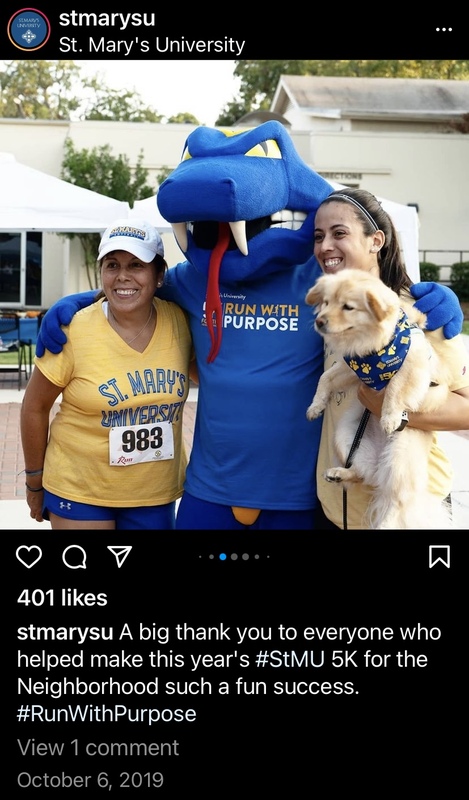
Looking Back to Look Forward and Adapting to Overcome
This St. Mary's University's Instagram post from October 6th, 2019 shows the annual 5k For The Neighborhood being held in person prior to the COVID-19 outbreak.
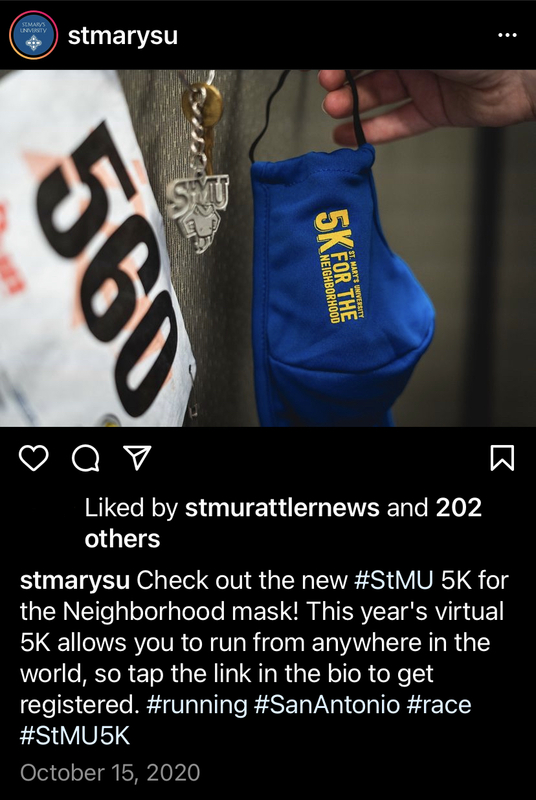
Looking Back to Look Forward and Adapting to Overcome
This post from St. Mary's University's Instagram page from October 15th, 2020 explains the switch to a virtual 5k For The Neighborhood.
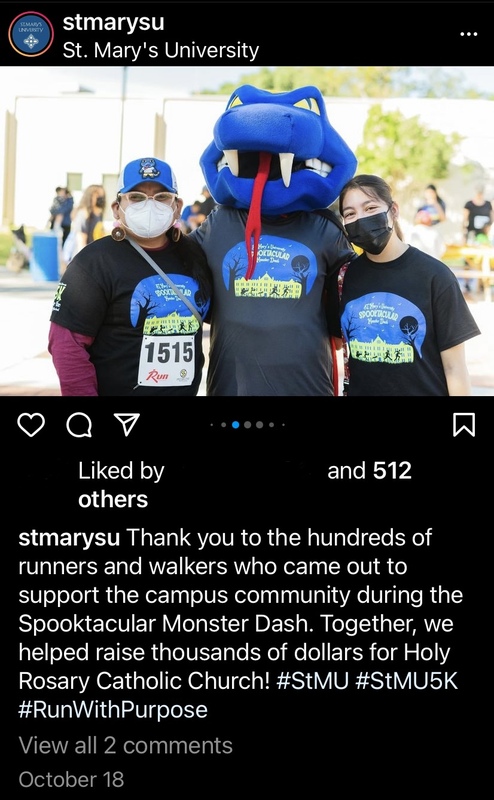
Looking Back to Look Forward and Adapting to Overcome
St. Mary's University's Instagram post from October 18th, 2021 shows an in-person 5k For The Neighborhood, with participants wearing masks and taking COVID-19 precautions.
Esports
Other extracurriculars, such as athletics, have always been an important component in bringing the student body together. With the beginning of the pandemic, university students could no longer rely on traditional sports to boost morale and school spirit. Esports, or competitive video games, is another way that technology can help students adapt to the problems they face within the pandemic such as loneliness or boredom. Both players and supporters are able to form a community and bond without ever meeting face to face. Discord, a type of community group chat, is a favorite tool among gamers and is less formal and more fun compared to a Zoom meeting.
A game and interaction are just a click away with esports. The introduction of esports to St. Mary's came just as spring break was extended in March 2020. Esports gave many students the opportunity to make personal connections that they were missing out on due to COVID. With the pandemic raging on and traditional sports being cancelled, esports events were able to continue, seeing as anyone with Wi-Fi connection can participate. The Director of Esports, Kaitlin Teniente, has also made sure to include the most casual of gamers. Even St. Mary’s staff like Dean of Students Bessler and President Mengler have joined in on games like Among Us and Fall Guys. The ability to virtually play videogames has helped promote unity and school spirit in a time when it has been needed the most.
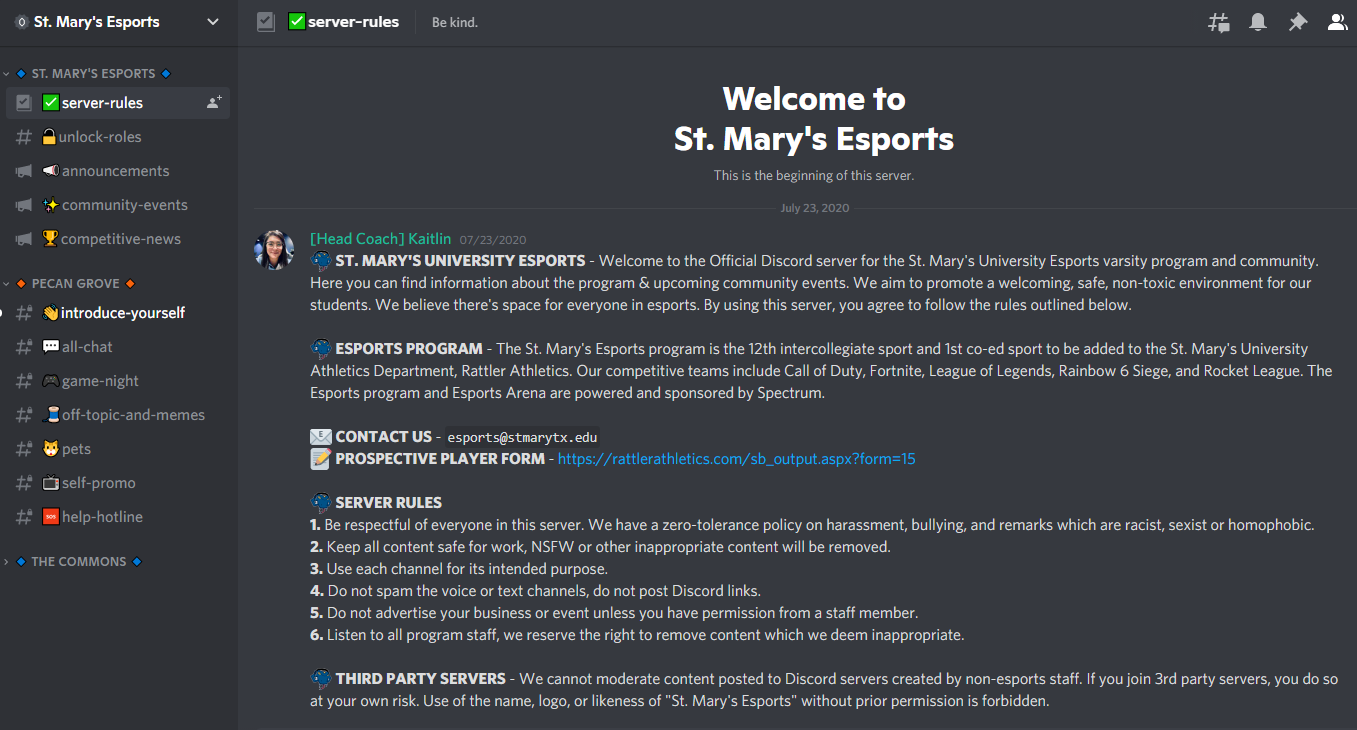
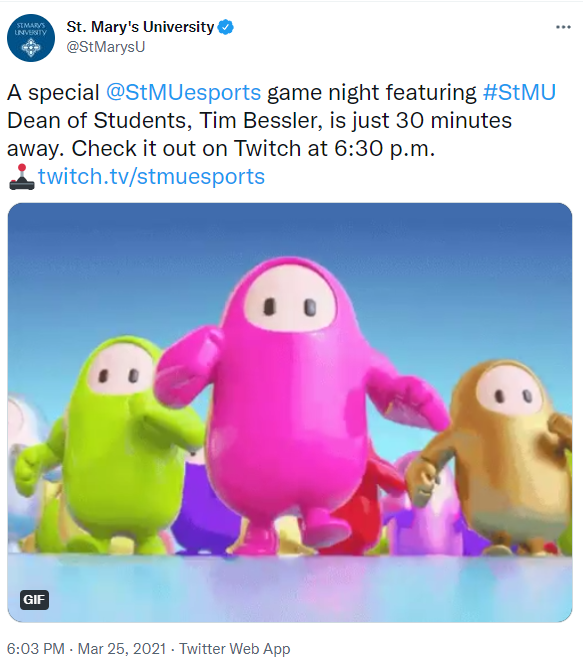
Incoming Students
The pandemic has clearly brought forth a greater appreciation for all things virtual, which can be seen in regards to the application process and communication with incoming and applied students. Making a transition is definitely harder to do in the midst of a pandemic when resources you would usually have are not available or have switched to be virtual. Incoming students to St. Mary's (freshman and transfer students) had to make accommodations. Things such as shortages of staff, for reasons like job cuts or COVID sickness, led to a switch to less-familiar techniques. Additionally, the lack of access to things such as in-campus tours caused this to be an even more messy situation for students still deciding on where to attend college. Unfortunately, due to COVID-19 restrictions, traveling to and touring the campus was very limited, and sometimes simply not available. While St. Mary's took steps to create more accessible virtual tours in effort to accommodate prospective students, it is evident that some students, like the ones interviewed below, would have appreciated more assistance and communicatications from the university throughout the application process.
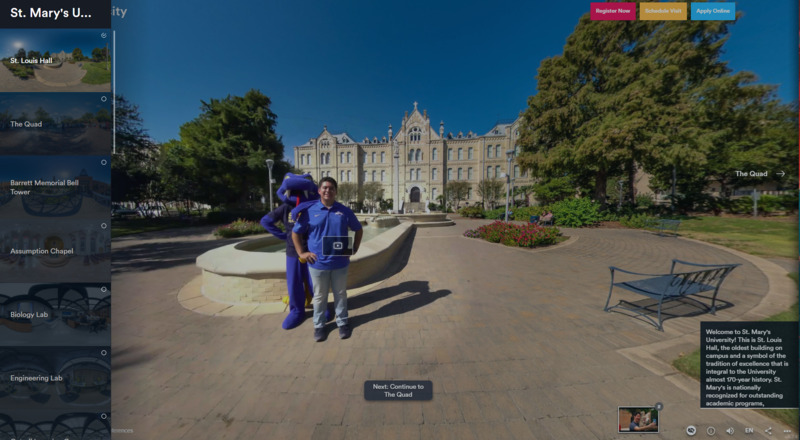
An Online University
A screenshot of St. Mary's virtual tour. This adaptation helped potential students explore the university online, allowing them to stay safe and continue practicing COVID restrictions.
Conclusion
The COVID-19 pandemic outbreak hit the world in unexpected and inconsistent ways. Because of this, life at St. Mary’s University began to look different for students, staff, and all other members of the community. Due to the constant change seen throughout the pandemic, whether it be spikes in confirmed cases or new research and information coming out, St. Mary’s University was faced with the need to adapt. This adaptation called for a need to accommodate and change procedures and routines. Virtually every aspect of life for the St. Mary’s community was affected in some way, from the classroom to extracurriculars to the admissions process. Through continued adaptation and the enforcement of masking, testing, and sanitizing procedures while knowing that the pandemic is ongoing and still changing, we have helped to combat the pandemic’s effects on the university. There have not been any significant spikes of COVID-19 on campus as of December 2021.

